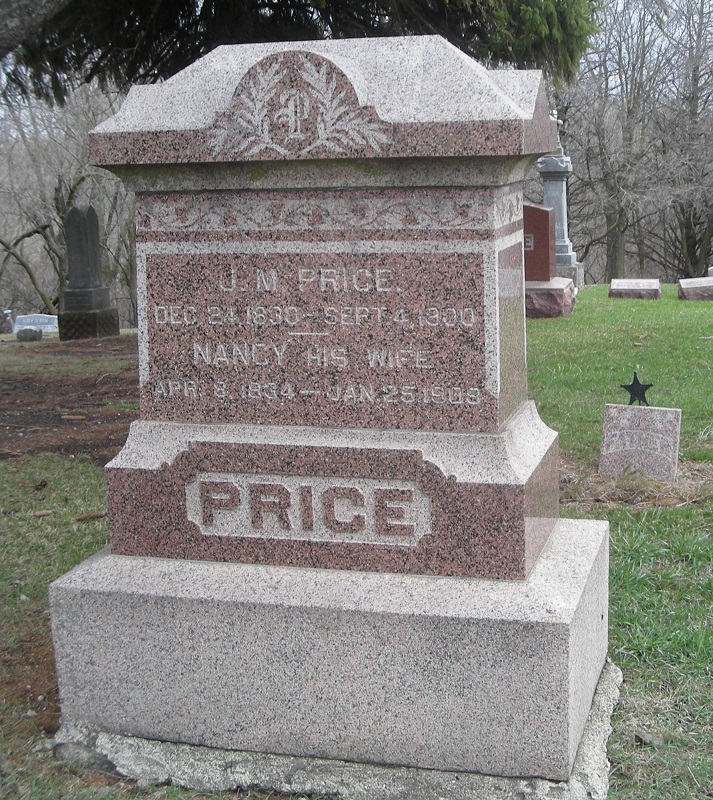My great, great grandfather moved to Illinois when he was 8 years old. He met his wife, Nancy VanOrder, in Iowa, they were married on Dec. 27, 1854.
Notice of death and Civil War records contributed by Dena Gray-Fisher, source: Story County Watchman, September 14, 1900
"Zearing Enterprise: J. M. Price was born in Uniontown, Pennsylvania, December 24th, 1830 an died at his home in Zearing, Ia., Thursday, Sept. 4th, 1900, at 2 p. m..."
U.S. Civil War Soldier Records and Profiles:
Name: James M Price
Residence: Weesaw Township, Berrien County, Michigan
Age at enlistment: 31
Enlistment Date: 15 Aug 1862
Rank at enlistment: 1st Sergeant
Enlistment Place: Galien, Berrien County, Michigan
Enlisted in Company G, Michigan 26th Infantry Reg. on 12 Dec 1862.
Mustered out 28 Nov 1863 at Washington, DC. Due to illness.
Source: Record of Service of Michigan Volunteers 1861-65"
____________________________________________
"Clinical Records for Malarial Disease...Intermittents becoming remittent. -- Case 21. -- Sergeant Jas. M. Price, Co. G, 26th Mich. Vols.; age 31; while en route with his regiment for New York City on account of the draft riots, was taken, while in Washington, D. C, July 13, 1863, with intermittent fever, which recurred daily. On admission on the 18th he was much prostrated, having just passed the sweating stage of that day's paroxysm. One grain of quinine was prescribed for administration every hour until symptoms of cinchonism was produced. He took eleven grains, and next day the skin was hot and dry, the tongue coated, and the urine high colored and scant; towards noon there was a remission. On the 21st the disease was distinctly remittent. Quinine was given during the remissions and acetate of ammonia during the exacerbations. In a day or two the fever ceased and did not recur, but the patient was quite feeble, anaemic and without appetite. On the 28th he stayed up dressed for a short time. Tincture of iron was given. He was returned to duty on September 7. -- Act. Ass't. Surg. G. M. Smith, U. S. Army, Ladies' Home Hospital, New York City." -- The Medical and Surgical History of the War of the Rebellion. Part III, Volume I. (3rd Medical volume) by U. S. Army Surgeon General's Office, 1888.
My great, great grandfather moved to Illinois when he was 8 years old. He met his wife, Nancy VanOrder, in Iowa, they were married on Dec. 27, 1854.
Notice of death and Civil War records contributed by Dena Gray-Fisher, source: Story County Watchman, September 14, 1900
"Zearing Enterprise: J. M. Price was born in Uniontown, Pennsylvania, December 24th, 1830 an died at his home in Zearing, Ia., Thursday, Sept. 4th, 1900, at 2 p. m..."
U.S. Civil War Soldier Records and Profiles:
Name: James M Price
Residence: Weesaw Township, Berrien County, Michigan
Age at enlistment: 31
Enlistment Date: 15 Aug 1862
Rank at enlistment: 1st Sergeant
Enlistment Place: Galien, Berrien County, Michigan
Enlisted in Company G, Michigan 26th Infantry Reg. on 12 Dec 1862.
Mustered out 28 Nov 1863 at Washington, DC. Due to illness.
Source: Record of Service of Michigan Volunteers 1861-65"
____________________________________________
"Clinical Records for Malarial Disease...Intermittents becoming remittent. -- Case 21. -- Sergeant Jas. M. Price, Co. G, 26th Mich. Vols.; age 31; while en route with his regiment for New York City on account of the draft riots, was taken, while in Washington, D. C, July 13, 1863, with intermittent fever, which recurred daily. On admission on the 18th he was much prostrated, having just passed the sweating stage of that day's paroxysm. One grain of quinine was prescribed for administration every hour until symptoms of cinchonism was produced. He took eleven grains, and next day the skin was hot and dry, the tongue coated, and the urine high colored and scant; towards noon there was a remission. On the 21st the disease was distinctly remittent. Quinine was given during the remissions and acetate of ammonia during the exacerbations. In a day or two the fever ceased and did not recur, but the patient was quite feeble, anaemic and without appetite. On the 28th he stayed up dressed for a short time. Tincture of iron was given. He was returned to duty on September 7. -- Act. Ass't. Surg. G. M. Smith, U. S. Army, Ladies' Home Hospital, New York City." -- The Medical and Surgical History of the War of the Rebellion. Part III, Volume I. (3rd Medical volume) by U. S. Army Surgeon General's Office, 1888.























